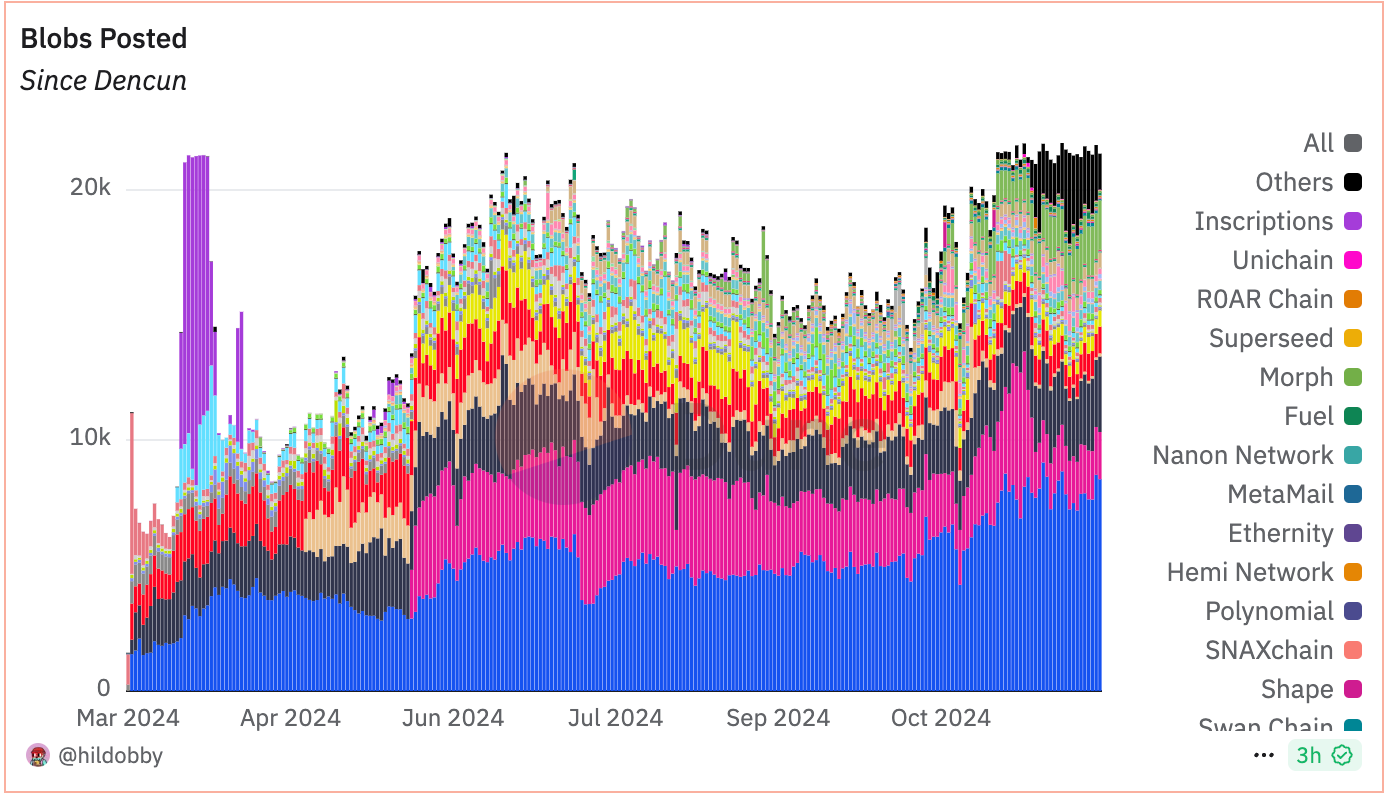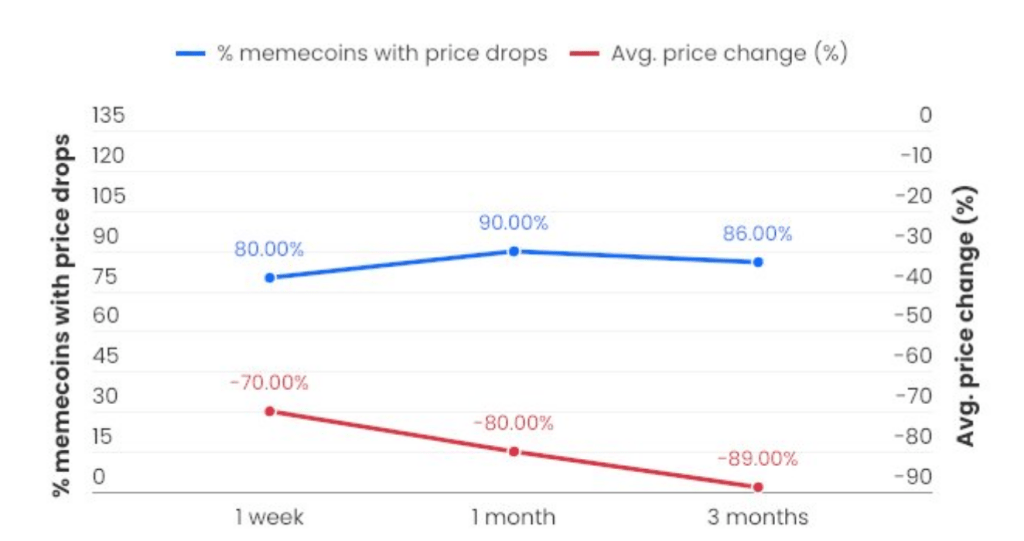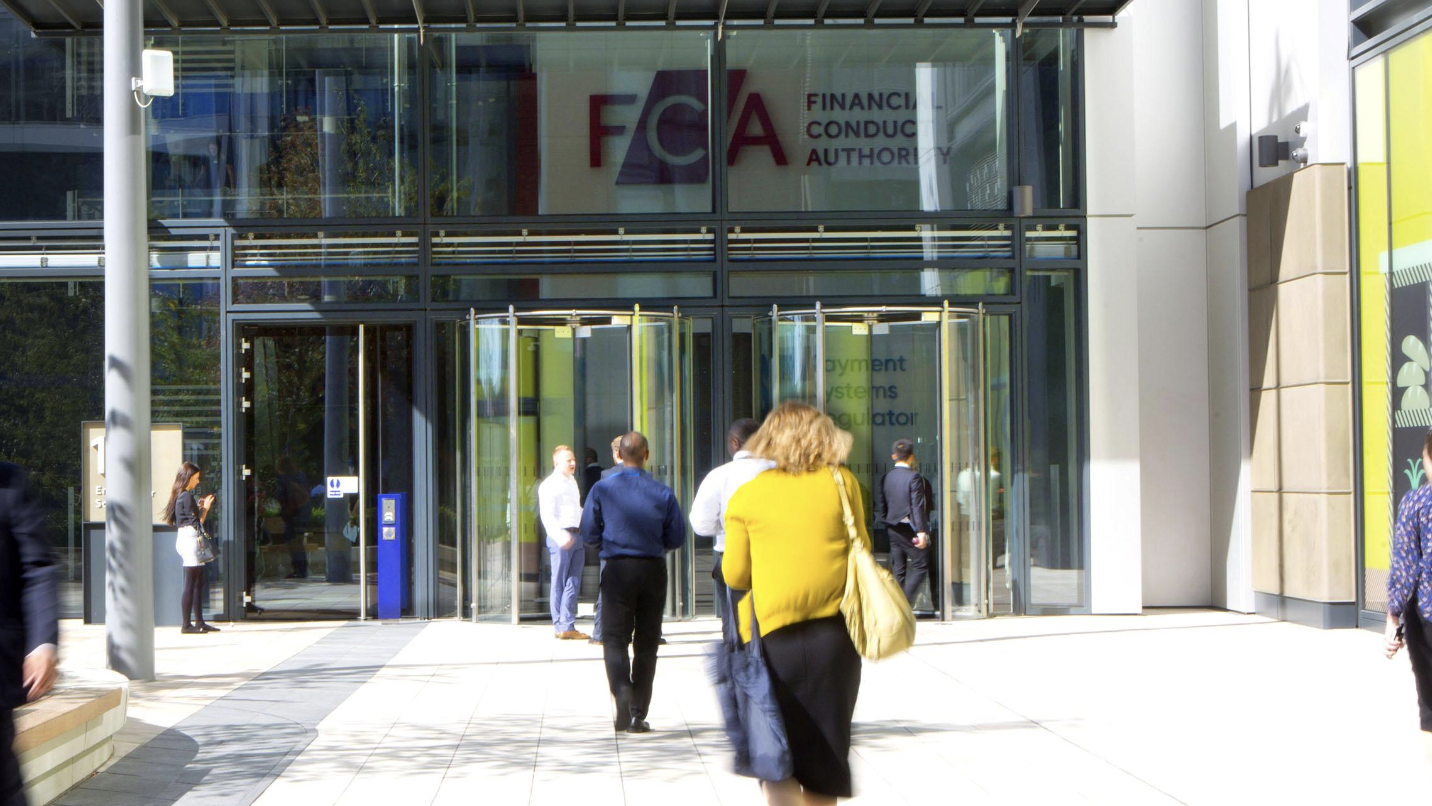Analysis:
Bitcoin’s drop to $94,000 is seen as a routine correction in an otherwise bullish trend. On-chain metrics like MVRV and NUPL continue to point to strength, and selling pressure is coming mainly from short-term holders realizing profits. This correction provides an opportunity for strategic accumulation as the long-term target of $100K remains unchanged.
Impact:
The pullback highlights the risks of leveraged positions but underscores the resilience of Bitcoin’s market fundamentals. Long-term holders remain confident, reinforcing the bullish narrative.
Key Takeaways:
- Bitcoin’s current dip aligns with typical market cycles in a bullish phase.
- Strong on-chain indicators suggest continued positive momentum.
- The correction could offer strategic buying opportunities.
Ethereum Blob Usage Soars as Traders Embrace Layer 2 Scaling Solutions
Analysis:
Ethereum’s use of “blobs” has spiked, driven by the growing adoption of Layer 2 solutions like Arbitrum and Optimism. In November, blob submissions reached record levels, improving transaction efficiency and lowering congestion. However, fees associated with blobs have risen significantly, reflecting increased demand.
Impact:
The surge in blob activity signals success in Ethereum’s scalability efforts, though rising costs could challenge user adoption. As blob fees are burned, this trend may reduce Ethereum’s circulating supply, positively affecting long-term value.
Key Takeaways:
- Layer 2 solutions are essential for Ethereum’s scalability.
- Higher blob fees show demand but highlight cost challenges.
- The ecosystem’s efficiency gains come with potential deflationary effects.
Donald Trump Plans AI Czar to Shape Federal Artificial Intelligence Policy
Analysis:
President-elect Donald Trump is considering appointing an “AI czar” to guide AI development and policy in the U.S. Although Elon Musk is not expected to take the role, his influence on AI initiatives is likely to be substantial. This move reflects the administration’s intention to strengthen U.S. leadership in AI innovation.
Impact:
The establishment of an AI czar signals a strategic push for AI leadership, potentially leading to increased federal investments in AI technologies and fostering innovation. However, this initiative also raises questions about regulatory and ethical frameworks for AI.
Key Takeaways:
- An AI czar emphasizes the U.S.’s commitment to AI development.
- Tech leaders like Elon Musk may significantly shape AI policy directions.
- New AI strategies could redefine regulatory and ethical standards.
Crypto Ownership in the UK Rises to 7 Million, Says FCA
Analysis:
The FCA reveals that 12% of UK adults now own cryptocurrency, up from 10% in 2022. The average holding has increased to £1,842, and high-value investments are becoming more common. Regulation remains a key concern, with a quarter of non-investors stating they would consider crypto if clearer policies were in place.
Impact:
The growing adoption highlights cryptocurrency’s mainstream appeal and deeper market penetration in the UK. Calls for regulation indicate that clearer frameworks could enhance consumer protection and boost investor confidence.
Key Takeaways:
- Crypto adoption in the UK is expanding, with higher average holdings.
- Regulatory clarity could attract more participants to the market.
- The FCA’s data reflects growing investor interest and confidence in crypto.
Crypto Influencers on X Found Promoting High-Failure Memecoins
Analysis:
A CoinWire study reveals that 76% of crypto influencers on X (formerly Twitter) have promoted memecoins that ultimately failed. Of 1,500 memecoins promoted by 377 influencers, only 1% achieved significant returns. Interestingly, smaller influencers (under 50,000 followers) saw better token performance than larger influencers, suggesting smaller accounts may align better with quality projects. Larger influencers, however, experienced average losses of 89% over three months, indicating a focus on paid promotions rather than genuine value.
Impact:
The high failure rate of promoted memecoins highlights the risks of blindly trusting influencer endorsements. This could lead to increased skepticism among investors and calls for better disclosure practices in the crypto community. Thorough due diligence is critical for safeguarding investments in this speculative space.
Key Takeaways:
- Memecoin Risks: Most memecoins promoted by influencers fail, showcasing their speculative nature.
- Influencer Accountability: Larger influencers may prioritize financial incentives, affecting project outcomes.
- Need for Investor Awareness: Research is essential to avoid reliance on promotions when investing in crypto.
Asia’s Largest Digital Bank Launches Retail Cryptocurrency Trading in Hong Kong
Analysis:
ZA Bank, Hong Kong’s largest digital bank, has introduced a retail cryptocurrency trading service, allowing users to trade digital assets directly through its app. This initiative eliminates the need for third-party platforms, streamlining the trading process for retail customers. The service supports transactions in Hong Kong dollars (HKD) and US dollars (USD), focusing on leading cryptocurrencies. To ensure security and compliance, ZA Bank has partnered with HashKey Exchange, a licensed virtual asset exchange in Hong Kong.
Impact:
This development signifies a significant step in integrating traditional banking with digital assets in Asia. By offering direct cryptocurrency trading, ZA Bank positions itself as a pioneer in the region’s fintech landscape. The partnership with HashKey Exchange ensures adherence to regulatory standards, potentially boosting consumer confidence in digital asset transactions. This move may also encourage other financial institutions to explore similar services, fostering broader adoption of cryptocurrencies.
Key Takeaways:
- Pioneering Integration: ZA Bank’s service bridges traditional banking and digital assets, enhancing accessibility for retail customers.
- Regulatory Compliance: Collaboration with a licensed exchange underscores the importance of adhering to regulatory frameworks in cryptocurrency services.
- Market Influence: This initiative could set a precedent for other banks in Asia, potentially accelerating the mainstream adoption of cryptocurrencies in the region.
UK Financial Regulator Targets Comprehensive Crypto Framework by 2026
Analysis:
The UK’s Financial Conduct Authority (FCA) has unveiled a strategic plan to implement a comprehensive regulatory framework for cryptocurrencies by 2026. This initiative aims to align crypto regulations with those governing traditional financial markets, focusing on areas such as capital requirements, insider trading, and execution standards. The FCA’s roadmap includes launching a market abuse regulation discussion paper in Q4 2024, followed by consultations on order handling, custody, and a prudential rulebook in the first half of 2025. By Q3 2025, the FCA plans to develop versions of its Consumer Duty and Senior Managers and Certification Regime tailored for digital assets.
Impact:
The FCA’s proactive approach reflects the UK’s ambition to establish itself as a global hub for digital assets. By creating a clear and robust regulatory environment, the FCA aims to enhance market integrity and bolster consumer trust in the crypto sector. This move is expected to attract more institutional investors and legitimate crypto businesses to the UK, fostering innovation while ensuring adequate consumer protection. However, the regulatory process may face delays due to political factors, such as the upcoming general election.
Key Takeaways:
- Strategic Regulatory Development: The FCA’s detailed roadmap underscores its commitment to integrating crypto assets into the UK’s financial regulatory framework.
- Enhanced Market Confidence: Comprehensive regulations are anticipated to increase investor confidence and attract reputable crypto enterprises to the UK.
- Potential Challenges: Political events, including the general election, could influence the timeline and implementation of the proposed crypto regulations.






